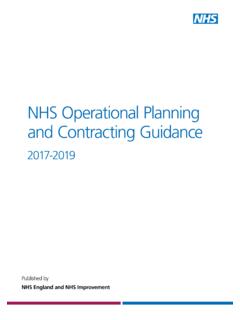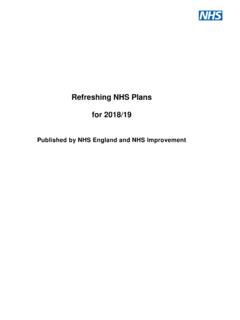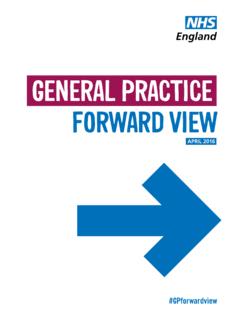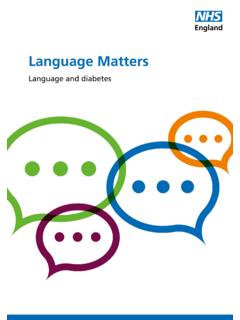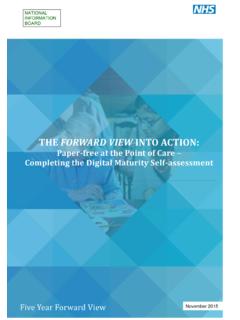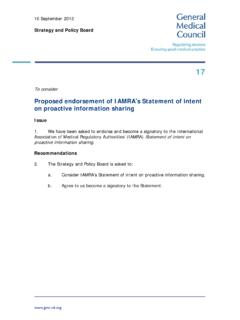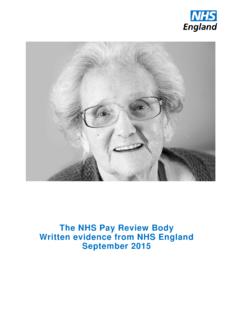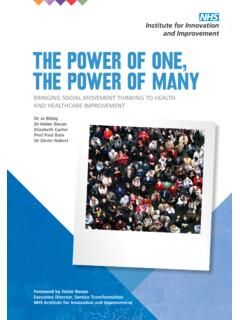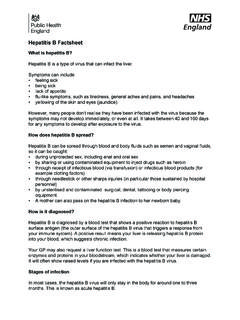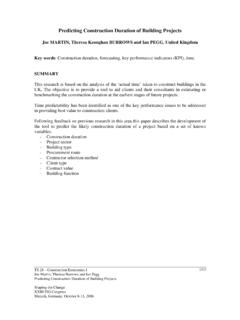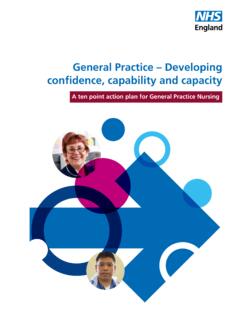Transcription of Managing Safeguarding Allegations Against Staff: Policy ...
1 Managing Safeguarding Allegations Against staff : Policy and Procedure NHS England and NHS Improvement OFFICIAL 2 Document Title: Managing Safeguarding Allegations Against staff : Policy and Procedure Version number: 3 First published: 27th March 2014 Updated: 25 March 2019 Prepared by: NHS Safeguarding Team, supported and authorised by NHS Improvement. This is a controlled document. Whilst this document may be printed, the electronic version posted on the intranet is the controlled copy. Any printed copies of this document are not controlled. As a controlled document, this document should not be saved onto local or network drives but should always be accessed from the intranet. OFFICIAL 3 Contents 1 Introduction .. 4 2 NHS England and NHS Improvement commitments and 4 3 Application and scope .. 4 4 Managing Allegations : Immediate actions .. 5 5 Procedure for reporting and Managing Allegations : NHS England & NHS Improvement staff .
2 6 6 Procedure for reporting and Managing Allegations : Non-directly employed staff .. 8 7 Disclosure and Barring Service (DBS) .. 10 8 Record-keeping .. 11 9 Post-investigation review .. 12 10 Monitoring .. 12 11 Equality and health inequalities analysis .. 12 Appendix 1: Definitions of 'at risk', 'harm' and 'relevant conduct' .. 15 Appendix 2: Managing Allegations Process Flowchart .. 22 Appendix 3: Record-keeping checklist .. 23 OFFICIAL 4 1 Introduction This Policy provides a framework for Managing Allegations Against NHS England & NHS Improvement staff that indicate that a child, young person or adult at risk is believed to have suffered, or is likely to suffer, significant harm. It also applies to cases where a staff member is behaving in a way that suggests they are unsuited to working with these groups of people. This Policy is focused on the management of risk, based on an informed assessment of harm and abuse.
3 Definitions of harm can be found in Safeguarding Children and Young People, Adult Safeguarding : Roles and Competencies for Health Care staff (August 2018) and the Care Act (2014). This Policy should be read alongside the relevant NHS England & NHS Improvement policies relating to Safeguarding individuals, and policies for the identification, management and support of primary care practitioners. Consideration must also be given to contractors whose performance gives cause for concern. 2 NHS England and NHS Improvement: commitments and values The NHS Constitution establishes the principles and values of the NHS in England and the rights of patients, members of the public, and staff . It sets out the commitments of the NHS, together with the responsibilities that the public, patients and staff owe to one another, to ensure that the NHS operates fairly and effectively. As a publicly-funded NHS body, and in line with the Constitution, NHS England & NHS Improvement aspires to the highest standards of excellence and professionalism in the leadership and management of the organisation, the people it employs, and the education, training and development they receive.
4 3 Application and scope This Policy applies to all NHS England & NHS Improvement staff , and anyone working on behalf of, or undertaking work for, or volunteering for, NHS England & NHS Improvement. It applies to all employees and contractors of NHS England & NHS Improvement, including: GPs dental practitioners pharmacists optometrists secondees into and out of the organisation volunteers, as defined by the NHS OFFICIAL 5 students honorary appointees trainees contractors temporary workers, including locum doctors and those working on a bank or agency contract staff registered as performers on the National Performers List. For ease of reference, all employees and workers who fall into these groups are referred to as staff in this document. The Policy covers Allegations made Against staff both within and outside their NHS England & NHS Improvement duties, such as in their private life, including: the commitment of a criminal offence Against , or related to, a child, young person or adult at risk; a failure to work collaboratively with social care agencies when an issue about the care of a child, young person or adult at risk for whom they have caring responsibilities, is being investigated; behaving towards a child, young person or adult at risk in a way that suggests they are unsuitable to work with them; the commitment of domestic violence or abuse, or the failure to ensure that a vulnerable individual is protected from the impact of such violence or abuse; and abuse Against someone closely associated with a member of staff , such as a partner, or a member of the family or household.
5 Although Managing Safeguarding Allegations Against staff is covered by the Children Acts (1989/2004), this Policy also applies to vulnerable adults at risk of harm or abuse as per the Care Act (2014). Working Together to Safeguard Children (2018) states that all statutory organisations should have a procedure for Managing Allegations Against staff . 4 Managing Allegations : Immediate actions The regions will need to understand their local multi-agency policies and procedures for Managing Allegations , in conjunction with the NHS England and NHS Improvement Accountability and Assurance Frameworks. Three separate actions must be considered when an allegation is made: enquiries and assessment by child/adult social care, into whether a child/young person/adult at risk of harm or abuse is in need of protection a police investigation of a possible criminal offence disciplinary action (including suspension). OFFICIAL 6 The safety of the child, young person or adult at risk is of paramount importance, and immediate action may be crucial in Safeguarding an investigation.
6 Where there is concern that other individuals may be at risk of harm or abuse, this must be reported immediately. Reputational issues must be managed appropriately, in discussion with the relevant communications team. All staff must be familiar with referral procedures for the protection of children and adults at risk. A concern must be reported to a staff member s line manager, who should take advice from the regional or central Safeguarding lead. See Appendix 2 for a flowchart of this process. All LSCBs and SABs have their own websites, which set out their Safeguarding policies and procedures. In addition, each Local Authority has a Local Authority Designated Officer (LADO) to act on its behalf in investigating Allegations - a role cited in the Savile investigations as critical for working in partnership with the NHS. The LADO should be informed of all Allegations , in line with local Safeguarding procedures. A Serious Incident Report of an allegation Against a member of staff should be managed using Strategic Executive Information System (StEIS) methodologies.
7 It is crucial that no action taken by NHS England & NHS Improvement to manage an allegation will jeopardise an external investigation, such as a criminal investigation. 5 Procedure for reporting and Managing Allegations : NHS England directly employed staff and performers Every effort must be made to maintain confidentiality, and manage communications effectively, whilst an allegation is being investigated. Any information-sharing must comply with the requirements of data protection legislation1, the Human Rights Act and the common law duty of confidence. Please refer to section 7 about the Disclosure and Barring Service (DBS). Each NHS England & NHS Improvement region, and the central support team, will have a Nominated Safeguarding Senior Officer (NSSO) who will lead and co-ordinate investigations - and be of sufficient seniority to make decisions - on behalf of NHS England. Where there is no-one in this role, the Regional Chief Nurse will act as the point of contact to identify and appoint the NSSO.
8 The NSSO should ensure (if appropriate) that a child protection/adult at risk referral is made (or has been made) to the relevant social care team and, 1 The EU General Data Protection Regulation and Data Protection Act 2018 OFFICIAL 7 where necessary, the police, using the appropriate reporting form. The referral must be put in writing to child/adult social care by the reporting individual within 24 hours, or on the next working day (in the case of a weekend). Where the issue relates to a child, the NSSO will liaise with the LADO, to agree on the information that needs to be shared with other geographical areas. The LADO can be contacted through the local Social Care team or the LSCB contact lead. Immediate issues of investigation and management of the employee should be discussed and agreed at this time, including what information should be passed to the staff member concerned.
9 Where the issue relates to an adult, the NSSO will discuss the case and Allegations with the relevant adult social care department manager and the police, to decide which agency should lead the investigation. The NSSO will work with HR and the staff member s line manager, to decide whether suspension is appropriate during the period of investigation. HR will advise whether the NHS England & NHS Improvement disciplinary procedure is to be followed, or, in the case of a performer subject to the Performers List regulations, which procedure should be followed. HR advice will be pertinent to all staff , regardless of their employment status with NHS England & NHS Improvement. The NSSO should ensure the Director of the relevant regional or central Safeguarding team is informed about the allegation. Following notification to child/adult social care and/or the police, the NSSO should undertake an internal Strategy Planning Meeting, to decide how to manage the allegation.
10 The following people should attend: the NSSO the LADO the staff member s line manager a senior member of staff from the Directorate or region concerned the Safeguarding Lead for the area covered a senior member of staff from the relevant regional or national support centre appropriate members of the HR team an appropriate designated professional, to act as Safeguarding expert. The Strategy Planning Meeting will: consider what further contact is required with regional staff , local police, and/or child/adult social care nominate a member of the investigation team as the link person establish whether the child/young person/adult at risk of harm or abuse is safe from any further risk of harm or abuse OFFICIAL 8 review the action already undertaken to ensure the safety of the victim decide on the internal investigation strategy make a referral to the appropriate professional body, GMC or NMC, if applicable.
